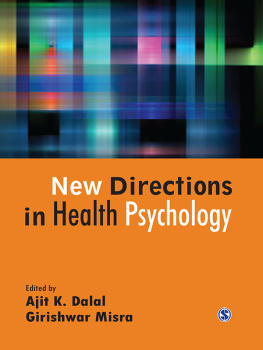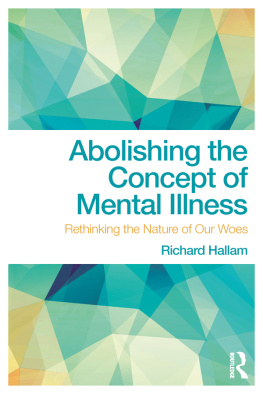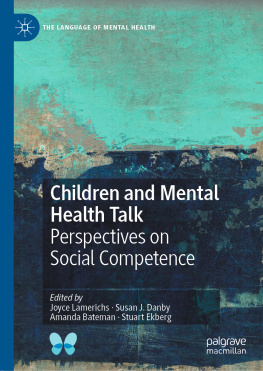Cover Page
New Directions
in
Health Psychology
Thank you for choosing a SAGE product! If you have any comment, observation or feedback, I would like to personally hear from you. Please write to me at contactceo@sagepub.in
Vivek Mehra, Managing Director and CEO,
SAGE Publications India Pvt Ltd, New Delhi
Bulk Sales
SAGE India offers special discounts for purchase of books in bulk. We also make available special imprints and excerpts from our books on demand.
For orders and enquiries, write to us at
Marketing Department
SAGE Publications India Pvt Ltd
B1/I-1, Mohan Cooperative Industrial Area
Mathura Road, Post Bag 7
New Delhi 110044, India
E-mail us at marketing@sagepub.in
Get to know more about SAGE, be invited to SAGE events, get on our mailing list. Write today to marketing@sagepub.in
New Directions
in
HEALTH PSYCHOLOGY
Edited by
Ajit K. Dalal
Girishwar Misra
Copyright Ajit K. Dalal and Girishwar Misra, 2012
All rights reserved. No part of this book may be reproduced or utilised in any form or by any means, electronic or mechanical, including photocopying, recording or by any information storage or retrieval system, without permission in writing from the publisher.
First published in 2012 by
SAGE Publications India Pvt Ltd
B1/I-1 Mohan Cooperative Industrial Area
Mathura Road, New Delhi 110 044, India
www.sagepub.in
SAGE Publications Inc
2455 Teller Road
Thousand Oaks, California 91320, USA
SAGE Publications Ltd
1 Olivers Yard, 55 City Road
London EC1Y 1SP, United Kingdom
SAGE Publications Asia-Pacific Pte Ltd
33 Pekin Street
#02-01 Far East Square
Singapore 048763
Published by Vivek Mehra for SAGE Publications India Pvt Ltd, typeset in 10/12 Goudy Old Style by Star Compugraphics Private Limited, Delhi and printed at Chaman Enterprises, New Delhi.
Library of Congress Cataloging-in-Publication Data Available
ePUB ISBN: 9788132119005
The SAGE Team: Sharel Simon, Pranab Jyoti Sarma
Contents
Part I
Conceptual Foundations
Part II
Social and Developmental Context of Health
Part III
Perspectives on Healing
Part IV
Overcoming Distress
Part V
Challenges Ahead
T ABLES
13.3 Multiple Regression Analysis for Total Sample: Anasakti , WSS and ADR as Independent Variables, Strain as
Dependent Variable
Figures
Dharmarth kama mokshanam arogyam mulamuttaman .
(Health is the key resource for the pursuit of duty, pursuit of wealth, fulfilment of desires and liberation.)
We are living in an age of unprecedented technological developments that are changing the contours of time and space; developments that configure our life-world beyond imagination. The developments have created comforts and helped amplify our capabilities to transform our notions of who we are and how our experiences are organized. The reigning ideology of modernity with its assumptions of individualism and materialism has nurtured a view of human being which establishes the physical self as the ultimate reality and consumerism as the pathway. The resulting lifestyle is sedentary, and increasingly more and more of physical and mental activities are being assigned to machines. This is leading to various lifestyle diseases like diabetes, coronary heart disease (CHD), obesity, stress and anxiety, hypertension, depression, and so on.
In the prevailing discourse, health is embedded within a reductionist framework in which the human body or physique is treated as the ultimate reality. This perspective fits well within the medical model which is the primary basis of health care and policy planning around the globe. It is, therefore, not surprising that health is held as the absence of bodily dysfunction or disease. It took years to recognize the positive side of health and build on the psycho-social knowledge to improve ones state of subjective well-being. Health is now seen in a broader sense encompassing prevention of disease, treatment, growth and rehabilitation and, above all, a wholesome existence.
Refreshingly, the Indian tradition lays considerable emphasis on positive health and has provisions not only for the cure and prevention of diseases but also to enhance health. The indigenous systems of Yoga, Ayurveda and various folk traditions have delineated a number of prac-tices and interventions to augment health and well-being. Most of them are rooted in a broad-based ontological conceptualization in which a person is a composite entity consisting of body, mind and spirit. In this scheme, the state of health and well-being is dynamically located at the intersection of person and environment. That is why, Ayurveda and Yoga emphasize on samatva or balance between the inner and the outer (person and environment) which share common properties (i.e ., vata, pitta and ka f ). This is based on the view that life depends on the continuous interchange between the body and the environment.
In the Indian view, the entire world is supposed to be constituted by the same basic elements ( mahabhuta s ) . However, the specific constitutions of different individuals are quite diverse. Every human being has his or her own nature ( prakriti ) and temperament or inclination ( svabhava ). Thus, while everyone is constituted of the three primordial or basic attributes called the Tri-Gunas , i.e., sattva, rajas and tamas , they do differ in terms of the pattern of their relative salience. The unique pattern of behaviour exhibited by a person depends on the combination of these attributes. The lifestyle and (ill)healt-related behaviours and practices also function in relation to these attributes. The difficulties arise when there is a deviation from the balanced state, and therefore restoration of health and well-being requires steps to compensate for the imbalance. The remedies prescribed include (re)organization of diet, thought and action ( ahar, vichar and vyavahara ).
It is widely recognized that the modernist view is lopsided and the existential conditions necessarily demand attention to individuality as well as relatedness. The pursuit of well-being, however, is currently marred by the preoccupation with material pursuits and consumption. This perpetuates the chain of suffering and pain. The consumerist culture gives prominence to the accumulation of money and unmindful consumption of social and environmental resources in the service of the egoistic self. The feeling of agency and control over the environment becomes central and communion remains secondary and subservient to the egoistic self. This seems rewarding from a short-term perspective. However, the same becomes dangerous and painful when viewed from a long-term perspective. Environmental challenges like global warming and greenhouse effect clearly demonstrate the dreadful consequences of the short-term perspective of the limited self. Self-aggrandizement is becoming a curse, although we are blind to it. A relational and inclusive view of self recognizes the legitimacy of others and treats them as constitutive. The boundary of the self then becomes a bridge for communion and facilitates the welfare of everyone. In fact, the shift towards an inclusive self becomes a transcendental and spiritual journey.














